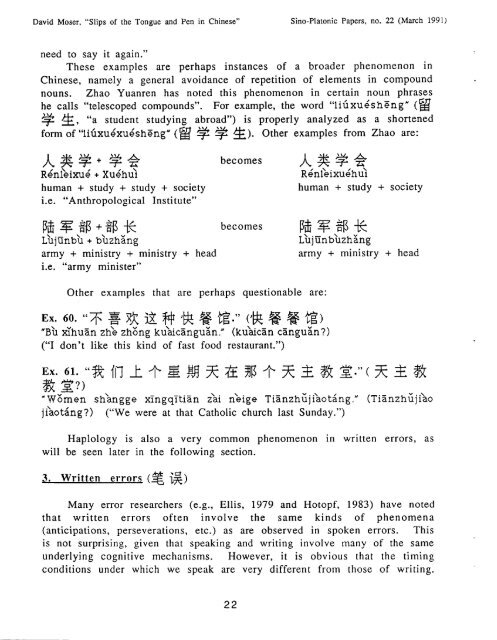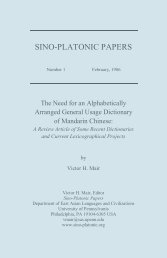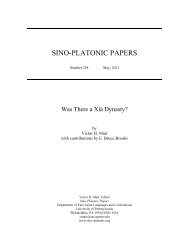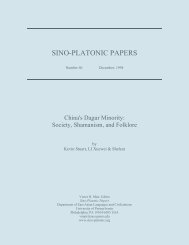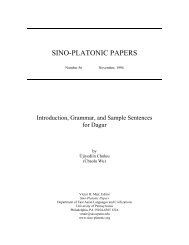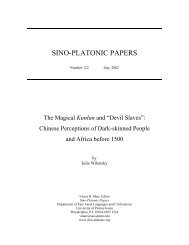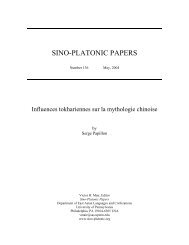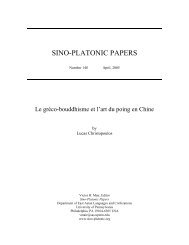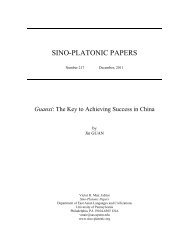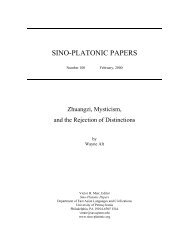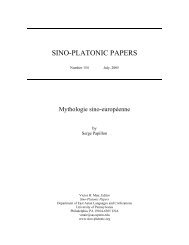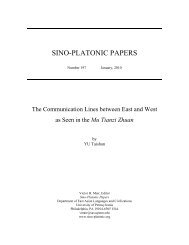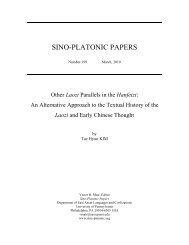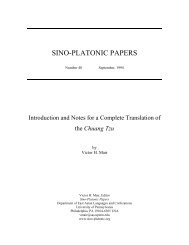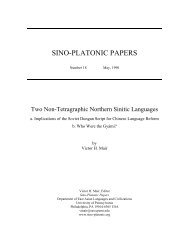Slips of the Tongue and Pen in Chinese - Sino-Platonic Papers
Slips of the Tongue and Pen in Chinese - Sino-Platonic Papers
Slips of the Tongue and Pen in Chinese - Sino-Platonic Papers
You also want an ePaper? Increase the reach of your titles
YUMPU automatically turns print PDFs into web optimized ePapers that Google loves.
David Moser, "<strong>Slips</strong> <strong>of</strong> <strong>the</strong> <strong>Tongue</strong> <strong>and</strong> <strong>Pen</strong> <strong>in</strong> Ch<strong>in</strong>ese" S<strong>in</strong>o-<strong>Platonic</strong> <strong>Papers</strong>, no. 22 (March 199 1 j<br />
need to say it aga<strong>in</strong>."<br />
These examples are perhaps <strong>in</strong>stances <strong>of</strong> a broader phenomenon <strong>in</strong><br />
Ch<strong>in</strong>ese, namely a general avoidance <strong>of</strong> repetition <strong>of</strong> elements <strong>in</strong> compound<br />
nouns. Zhao Yuanren has noted this phenomenon <strong>in</strong> certa<strong>in</strong> noun phrases<br />
he calls "telescoped compounds". For example, <strong>the</strong> word "1 ic xu 8s h8 n g ' (g<br />
&, "a student study<strong>in</strong>g abroad") is properly analyzed as a shortened<br />
form <strong>of</strong> "li~xu6xu~sh~ng' (a G *a &). O<strong>the</strong>r examples from Zhao are:<br />
human + study + study + society<br />
i.e. "Anthropological Institute"<br />
becomes<br />
%A<br />
~dnl\eixue'hu><br />
human + study + society<br />
WF$+$% becomes l%F$+?<br />
~'uji<strong>in</strong>b'u + b'uzhgng<br />
~'uj~nbbzhzng<br />
army + m<strong>in</strong>istry + m<strong>in</strong>istry + head army + m<strong>in</strong>istry + head<br />
i.e. "army m<strong>in</strong>ister"<br />
O<strong>the</strong>r examples that are perhaps questionable are:<br />
EX. 60. "F $ 2 # 'k @ Em" ('k @ @ g)<br />
"~'u shu2n zh'e zhzng ku'aic~ngukf' (ku\aicgn csngugn?)<br />
("I don't like this k<strong>in</strong>d <strong>of</strong> fast food restaurant.")<br />
Ex* 61* 6?!t <strong>in</strong> 1-7- EiZ M 2 z + 3% ?? z 3% 2z"(* z 3%<br />
% Z?)<br />
"~zmen sh'angge x<strong>in</strong>gqiti3n z'ai n'eige ~ianzhcji'aot6ng." (Ti~nzh6ji'ao<br />
ji'aodng?) ("We were at that Catholic church last Sunday.")<br />
Haplology is also a very common phenomenon <strong>in</strong> written errors, as<br />
will be seen later <strong>in</strong> <strong>the</strong> follow<strong>in</strong>g section.<br />
3. Written errors (3 $$)<br />
Many error researchers (e.g., Ellis, 1979 <strong>and</strong> Hotopf, 1983) have noted<br />
that written errors <strong>of</strong>ten <strong>in</strong>volve <strong>the</strong> same k<strong>in</strong>ds <strong>of</strong> phenomena<br />
(anticipations, perseverations, etc.) as are observed <strong>in</strong> spoken errors. This<br />
is not surpris<strong>in</strong>g, given that speak<strong>in</strong>g <strong>and</strong> writ<strong>in</strong>g <strong>in</strong>volve many <strong>of</strong> <strong>the</strong> same<br />
underly<strong>in</strong>g cognitive mechanisms. However, it is obvious that <strong>the</strong> tim<strong>in</strong>g<br />
conditions under which we speak are very different from those <strong>of</strong> writ<strong>in</strong>g.


